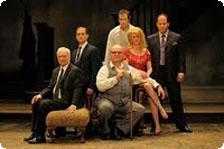by Gina Horan
At first there was laughter from everywhere in the audience. A.C.T.’s production of Harold Pinter’s “The Homecoming” is bursting with such clever lines and witty dialogue, to view the play as comedic seemed natural.
But, by the middle of act one, laughter faded into uncomfortable silence. Shock and discomfort followed.
Pinter’s Tony© Award winning play, directed by long-time Pinter collaborator Carey Perloff, hits every note a dysfunctional family can withstand and reminds the onlooker that comedy can only mask pain for so long.
Set in an old 1960’s North London house, The Homecoming centers on a family of men, whose lack of feminine influence leaves them embittered and fighting for alpha-male status, each one gaining territory and retreating with every verbal exchange.
Presented with no set changes, the scene is a living room, stairs leading up to the bedrooms, a front door and an imagined kitchen to the right. The walls are dark and the furniture old-fashioned, suggesting a long-time absence of a female.
The presumed “alpha” is Max, (Jack Willis) a retired butcher whose hard work-ethic afforded him the luxury of keeping the house in which he grew up. He shares the home with his brother and two of his sons, to whom he is physically and emotionally aggressive, wielding his cane like a sword and breathing verbal fire like a chained dragon.
Lenny (Andrew Polk) is the middle son who acts like he is the top dog to his washed-up, pathetic father. At first it appears he merely sits around the house and bets on horses. When his real pursuit becomes clear, we start to understand how his upbringing has affected his attitudes towards the opposite sex.
Baby brother Joey (Adam O’Byrne) is a strapping lad in his twenties, who works in demolition and aspires to be a boxer. His physicality is all he knows and the lack of motherly influence has left him nearly devoid of deep emotion.
Uncle Sam (Kenneth Welsh) humbly accepts his role as the house-proud caretaker, and is a constant source of scorn for Max. The elder brother all but sews a pink “letter” on Sam’s apron and drops innuendo about his sexual orientation at every given chance. Sam has his own way of fighting back, reminding Max of a shared past he can’t escape.
The four males seem confined to endure their co-dependant “Lord of the Flies” existence, until the dynamics change.
Halfway into the first act, it’s after midnight and the men are asleep. A key turns the front door and in walks Teddy, (Anthony Fusco) the prodigal eldest son, who has been away in the U.S. teaching philosophy for six years.
He brings his wife Ruth (Renė Augesen) who has never been introduced or even mentioned to the rest of the clan.
Lenny wakes up and meets her, trying to intimidate her with bravado until he is rebuffed with a symbolic sexual overtone.
The next morning, the housemates are surprised to see a woman coming down the stairs, a presence missed after mother and wife Jessie, died several years prior.
As Ruth enters the cave of Neanderthals there is an energy shift. She’s is suddenly a woman on the front lines; a girl in the locker room; a hen in the cock-house.
Will she be capable to defend herself against the infantry or become cannon fodder?
As the second act progresses, Teddy realizes his mistake and tries to initiate a departure, but it’s clear that Ruth loves the new attention and power, a far cry from her domestic duties and three-children back home.
As the past unfolds, secrets emerge. Max’s paternity is questioned. Ruth’s previous life is revealed her emotional and physical seduction of the men leads to a shocking plot twist few could foresee.
Perloff’s female sensibilities are apparent as she rejects the obvious overtones of misogyny and understands the power in Ruth’s presence.
“Ruth sets the terms of her own future,” says the director. “She decides exactly how she wants it to go.”
Willis’ “Max” is a loud, crass and domineering geezer whose bitterness is emblazoned on his sleeves. He bellows and spits, then coos through a devilish grin. Welsh’s “Sam” is understated and docile without being effeminate.
Lenny could be portrayed as purely spiteful, but Polk reveals sensitivity to the written vitriol. O’Byrne’s Joey is fit and believable and doesn’t allow the character to be one-dimensional.
Teddy, played with restraint by Fusco, seems emotionally castrated by Ruth, but manages to create some kind of logic and balance to a world he eschewed
Ruth is played to perfection by Augesen who serenely allows the men beat their chests, as if to already be defeated. In the end, her subtlety is well-calculated and ultimately serves her well.
With a stage full of North American actors, mastering regional London accents can be tricky. These professionals choose to pull-back and don’t try to get clever with over-the-top accents, which makes them all the more believable.
The set, designed for ACT by Daniel Ostling, gives the audience a sense that there hadn’t been any female energy in the house for sometime. The lighting is designed by Alexander V. Nichols and sound by Cliff Caruthers. Costume design was authentic 1960’s London and selected with discretion by Alex Jaeger.
The Homecoming is not for the sensitive or those without a stiff resolve. It can be brutal and raw and often hits on nerves that many families prefer to keep buried in the emotional archives.
Directed by Carey Perloff
WHERE: American Conservatory Theater, 415 Geary Street, San Francisco, CA 94108
WHEN: March 3–27, 2011
TICKETS: Tickets start from $10. (Current pricing $10–$85)
Tue.–Sat. at 8 p.m. (3/15 performance at 7 p.m.)
Wed., Sat. & Sun. at 2 p.m. (no matinee performances on 3/9)
Additional 7 p.m. performance on 3/13
TIX & INFO: 415.749.2228 | www.act-sf.org
NOTE: There is constant cigar and cigarette smoking on stage.






